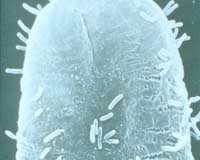 |
Sydney (AFP) Nov 30, 2010 Australia Tuesday agreed to allow the import of New Zealand apples for the first time in almost 90 years, but said it would first review quarantine to make sure they were free of pests. Australia lost its appeal overnight against a World Trade Organization ruling that it should accept the New Zealand fruit, forcing the export-dependent nation to give up the long-running fight. Australian Agriculture Minister Joe Ludwig said the government would now conduct a review of the import risks posed by New Zealand apples, a process which could take the best part of a year. "Just as for any other product, no trade in New Zealand apples can occur until quarantine measures that appropriately protect Australia and our agricultural producers have been determined," Ludwig said. "That will occur following the completion of the review." Australia first imposed a ban on New Zealand apples in the early 1920s over an outbreak of fireblight, a disease affecting fruit trees. Canberra lifted the outright ban in 2006 but imposed strict conditions which New Zealand said made its exports uneconomic, prompting it to complain to the WTO in 2007. In August, the WTO ordered Australia to ease the restrictions but Canberra launched an appeal, which was rejected on Tuesday. New Zealand Prime Minister John Key said his country had scored a "resounding victory" and he hoped Australia would not "play games" with unfair quarantine measures designed to bypass the decision. "We would be very disappointed if they did that and, at the end of the day, they put up their case, we put up ours. It's been a hard-fought process but New Zealand has had a resounding victory," he told TV ONE. "I do believe that Australians will be chomping their way through New Zealand apples before too soon."
Share This Article With Planet Earth
Related Links Farming Today - Suppliers and Technology
 Soil Microbes Define Dangerous Rates Of Climate Change
Soil Microbes Define Dangerous Rates Of Climate ChangeExeter, UK (SPX) Nov 30, 2010 The rate of global warming could lead to a rapid release of carbon from peatlands that would further accelerate global warming. Two recent studies published by the Mathematics Research Institute at the University of Exeter highlight the risk that this 'compost bomb' instability could pose, and calculate the conditions under which it could occur. The same Exeter team is now exploring ... read more |
|
| The content herein, unless otherwise known to be public domain, are Copyright 1995-2010 - SpaceDaily. AFP and UPI Wire Stories are copyright Agence France-Presse and United Press International. ESA Portal Reports are copyright European Space Agency. All NASA sourced material is public domain. Additional copyrights may apply in whole or part to other bona fide parties. Advertising does not imply endorsement,agreement or approval of any opinions, statements or information provided by SpaceDaily on any Web page published or hosted by SpaceDaily. Privacy Statement |